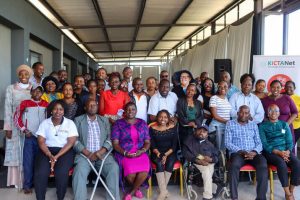Listers,
There is no denying where we are headed in as far as use of AI and how it
will use data (big and small)! Na hio ndio maendeleo (as MO1 would have
said)
However, we need to weigh on the Good to Have Vs Should Have and this might
just open a Pandora box!
*Good to Have*
The amount of good that can be harnessed from use of data through AI is
enormous. This ranges from medical diagnostics, through to law litigations,
to matters education, weather patterns etc. That data can be used to give
probably with an efficiency beyond the human mind.
To weigh in on this, we also need to look at the HUMAN side of it! Can AI
with all its intricacies, given all possible data permutations truly mimic
the emotional, human side that decisions are mostly made or is the
eradication of this very human nature what we aim to achieve?
*Should have*
Am aware that SHOULD is not the word we normally associate with when
comparing GOOD TO HAVE. The norm is MUST HAVE. I chose this word to be on
the middle ground so as not to appear to be forceful on it.
Governments and people in power would be beating the war drums to have AI
mine all data of ever living, dead and to be born persons! The national
security card would definitely be pulled up!
Whilst as citizens, we would definitely want to be living securely knowing
we are protected. However, if such data goes so deep as in analysing very
personal information that could be a cause of wars within homes… would
this be adding to the value of life?
So GOOD TO HAVE Vs SHOULD HAVE…that’s probably what I would sum it down
to!
THK
On Wed, Oct 14, 2020, 4:43 PM Winfred Anyona via kictanet <
[email protected]> wrote:
> Dear Listers,
>
> Artificial Intelligence can be used to provide better access to public
> services for the most vulnerable.
>
> User-centered design should address the experiences and views of people,
> especially vulnerable populations, who may be negatively impacted by new
> technologies.
>
> The idea of including users in the design and testing of new products and
> services is not new. What is perhaps unusual is the notion that groups who
> may be negatively impacted by a technology should be involved in their
> design and methods of promotion and use. Some firms however, have begun
> to embrace this practice as a moral and business imperative.
>
> There are inventive approaches and methods in a range of industries that
> the developers and users of AI solutions could build on, including:
>
> · Identifying legitimate representative or proxy organizations to
> engage with.
>
> · Using technology to enable affected rights-holders to share
> grievances and experiences.
>
> · Engaging directly with individuals who have suffered abuses in
> the past.
>
> · Diversifying the workforce to involve viewpoints informed by a
> wide variety of life experiences and challenges in company discussions.
>
>
>
> Kind Regards,
>
> Winfred Anyona
>
>
>
>
>
> On Wed, Oct 14, 2020 at 9:21 AM David Indeje via kictanet <
> [email protected]> wrote:
>
>> Barrack,
>>
>> It is not a rumour.
>> https://twitter.com/NAssemblyKE/status/1315988525251203072?s=20
>>
>> *Kind Regards,*
>>
>> *David Indeje *
>> +254 (0) 711 385 945 | +254 (0) 734 024 856
>>
>>
>> On Wed, 14 Oct 2020 at 08:58, Barrack Otieno via kictanet <
>> [email protected]> wrote:
>>
>>> Goodmorning Keith,
>>>
>>> Many thanks for starting this timely conversation. Yesterday i came
>>> across rumours in the blogosphere regarding the appointment of the Data
>>> Commissioner. Clearly Data will play a key role in this decade in our
>>> Social and Economic Spheres. We are seeing a way of life ‘working from
>>> home’, ‘Online learning’, ‘e-health’, ‘e-agriculture’ which will all be
>>> dependent on data. While contemplating how to respond to this discussion i
>>> kept asking myself whether we have or there is a need for a common
>>> definition of Data across all stakeholder groups. This could be a starting
>>> point that will make life easier for the Data Commissioner and all
>>> Stakeholder groups as a whole. Once we have a Common understanding, it will
>>> be easy to define our roles and responsibilities and use cases. We will
>>> also be able to define our Capacity building needs.
>>>
>>> I will be back with more.
>>>
>>> On Wed, Oct 14, 2020 at 7:36 AM Keith Andere via kictanet <
>>> [email protected]> wrote:
>>>
>>>> Dear Listers,
>>>>
>>>>
>>>>
>>>> I trust you are all having a great week. As you are aware this year
>>>> Kenya’s 2020 IGF will be one of a kind as it will be our first ever virtual
>>>> KIGF. It will be taking place on 29th October and as part of the build up
>>>> to this major event, we shall be having moderated 3-day online discussions
>>>> on this year’s KIGF theme.
>>>>
>>>>
>>>>
>>>> These discussions will allow us to not only learn some few things but
>>>> also designed to allow us to dig deeper into a range of topics and
>>>> ultimately apply those concepts on the Big Day!
>>>>
>>>>
>>>>
>>>> This year’s first sub theme is Data. The Data track will provide for
>>>> discussions on the fundamental challenge of ensuring the benefits of the
>>>> data revolution to contribute to inclusive economic development while
>>>> protecting the rights of people. Under this topic there are also matters to
>>>> do with digital identity, data and jurisdiction, data driven emerging
>>>> technologies, data access, quality, innovation and competition. To this
>>>> end, I invite your contributions to the following questions:
>>>>
>>>>
>>>> 1. What are/should be the rights and responsibilities for
>>>> individuals in determining the use of their personal data? How to ensure
>>>> transparency and accountability in the gathering and handling of personal
>>>> data?
>>>>
>>>> 2. What societal and economic benefits are enabled by the
>>>> trustworthy use of data to develop data-driven emerging technologies?
>>>>
>>>> 3. To what extent, if any, could the development of
>>>> international norms and principles facilitate common approaches and
>>>> interoperability of data protection frameworks, and also facilitate
>>>> international trade and cooperation?
>>>>
>>>> 4. What is the impact of AI and other data-driven technologies in
>>>> the exercise of rights of most vulnerable groups? How to implement them to
>>>> further advance their inclusion and avoid further harm?
>>>>
>>>> 5. How can we ensure equitable access to data for fostering
>>>> competition and innovation?
>>>>
>>>> Karibuni Mjadala.
>>>>
>>>> Regards
>>>> Keith
>>>>
>>>> —
>>>> Keith Andere
>>>> Internet Governance | Policy | Cyber Peace & Security | Sustainable
>>>> Development
>>>> W: wa.me/+254722565212 <wa.me/254722565212>
>>>> E: [email protected] / [email protected]
>>>> Twitter: @AndereKE
>>>> Skype: Keithess
>>>> LinkedIn <www.linkedin.com>
>>>> [image: linkedin icon] <www.linkedin.com/ke/andereke> [image:
>>>> twitter icon]
>>>> *Please consider the data privacy and confidentiality of this e-mail or
>>>> it’s contents.*
>>>>
>>>> _______________________________________________
>>>> kictanet mailing list
>>>> [email protected]
>>>> lists.kictanet.or.ke/mailman/listinfo/kictanet
>>>> Twitter: http://twitter.com/kictanet
>>>> Facebook: www.facebook.com/KICTANet/
>>>>
>>>> Unsubscribe or change your options at
>>>> lists.kictanet.or.ke/mailman/options/kictanet/otieno.barrack%40gmail.com
>>>>
>>>> The Kenya ICT Action Network (KICTANet) is a multi-stakeholder platform
>>>> for people and institutions interested and involved in ICT policy and
>>>> regulation. The network aims to act as a catalyst for reform in the ICT
>>>> sector in support of the national aim of ICT enabled growth and development.
>>>>
>>>> KICTANetiquette : Adhere to the same standards of acceptable behaviors
>>>> online that you follow in real life: respect people’s times and bandwidth,
>>>> share knowledge, don’t flame or abuse or personalize, respect privacy, do
>>>> not spam, do not market your wares or qualifications.
>>>>
>>>
>>>
>>> —
>>> Barrack O. Otieno
>>> +254721325277
>>> +254733206359
>>> Skype: barrack.otieno
>>> PGP ID: 0x2611D86A
>>>
>>>
>>>
>>>
>>> _______________________________________________
>>> kictanet mailing list
>>> [email protected]
>>> lists.kictanet.or.ke/mailman/listinfo/kictanet
>>> Twitter: http://twitter.com/kictanet
>>> Facebook: www.facebook.com/KICTANet/
>>>
>>> Unsubscribe or change your options at
>>> lists.kictanet.or.ke/mailman/options/kictanet/davidindeje%40gmail.com
>>>
>>> The Kenya ICT Action Network (KICTANet) is a multi-stakeholder platform
>>> for people and institutions interested and involved in ICT policy and
>>> regulation. The network aims to act as a catalyst for reform in the ICT
>>> sector in support of the national aim of ICT enabled growth and development.
>>>
>>> KICTANetiquette : Adhere to the same standards of acceptable behaviors
>>> online that you follow in real life: respect people’s times and bandwidth,
>>> share knowledge, don’t flame or abuse or personalize, respect privacy, do
>>> not spam, do not market your wares or qualifications.
>>>
>> _______________________________________________
>> kictanet mailing list
>> [email protected]
>> lists.kictanet.or.ke/mailman/listinfo/kictanet
>> Twitter: http://twitter.com/kictanet
>> Facebook: www.facebook.com/KICTANet/
>>
>> Unsubscribe or change your options at
>> lists.kictanet.or.ke/mailman/options/kictanet/winfred.anyona%40strathmore.edu
>>
>> The Kenya ICT Action Network (KICTANet) is a multi-stakeholder platform
>> for people and institutions interested and involved in ICT policy and
>> regulation. The network aims to act as a catalyst for reform in the ICT
>> sector in support of the national aim of ICT enabled growth and development.
>>
>> KICTANetiquette : Adhere to the same standards of acceptable behaviors
>> online that you follow in real life: respect people’s times and bandwidth,
>> share knowledge, don’t flame or abuse or personalize, respect privacy, do
>> not spam, do not market your wares or qualifications.
>>
>
> *Note: *All emails sent from Strathmore University are subject to
> Strathmore’s Email Terms & Conditions. Please click here
> <www.strathmore.edu/en/email-policy> to read the policy.
>
> “Visit our Facebook <www.facebook.com/StrathmoreUniversity>Page
> and Twitter
> _______________________________________________
> kictanet mailing list
> [email protected]
> lists.kictanet.or.ke/mailman/listinfo/kictanet
> Twitter: http://twitter.com/kictanet
> Facebook: www.facebook.com/KICTANet/
>
> Unsubscribe or change your options at
> lists.kictanet.or.ke/mailman/options/kictanet/twahir%40hussein.me.ke
>
> The Kenya ICT Action Network (KICTANet) is a multi-stakeholder platform
> for people and institutions interested and involved in ICT policy and
> regulation. The network aims to act as a catalyst for reform in the ICT
> sector in support of the national aim of ICT enabled growth and development.
>
> KICTANetiquette : Adhere to the same standards of acceptable behaviors
> online that you follow in real life: respect people’s times and bandwidth,
> share knowledge, don’t flame or abuse or personalize, respect privacy, do
> not spam, do not market your wares or qualifications.
>
_______________________________________________
kictanet mailing list



